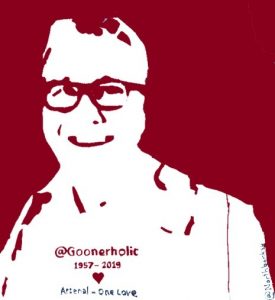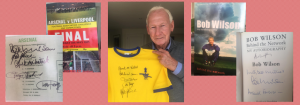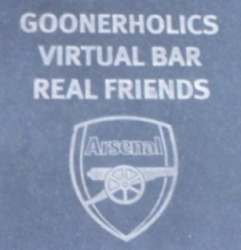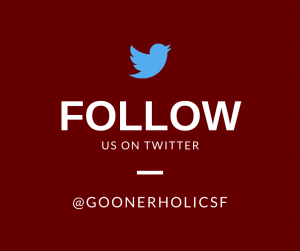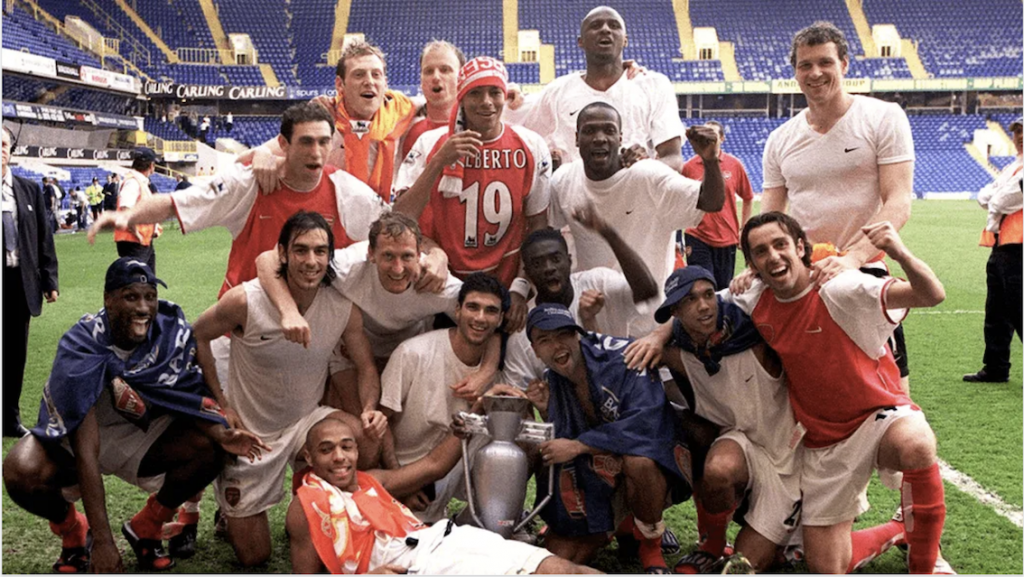
So, it comes around again. Our visit to the dark side, at the sleazy end of Via Septum Sororum. The 209th North London Derby, of which we have won 86, drawn 55 and lost 67. This is our 92nd league fixture in the Slough of Despond where we have won 26 times and drawn 26 times. Since the inception of the Premier League (which as we all now know was the dawn of soccer civilisation), we have visited 31 times, winning on 6 occasions and drawing on 12 occasions.
However this time, it’s a must win game. There’s a great deal riding on this result as we enter the final straight of a three horse race to the Premier League title with the C115y mercenaries breathing down our necks. While all contenders have at least four games to play (C115y have 5) and we know that there are several potential twists yet to come, there’s also a sense that we cannot afford to drop any points at all because of the standard set by the financially doped Mancs. The Marshdwellers would love nothing more than to derail our title bid while they still have aspirations to pip Villa to the fourth place trophy. Everton’s mugging of the Mugsmashers in midweek offers a forewarning of how the passion of a local derby can overwhelm the more cultured participant. Yet, we have visited the Toilet Bowl in the past needing a result and have delivered the results required to lift silverware.
On May 3, 1971, Arsenal faced the Marshdwellers in the final game of the season with a first league title in 18 years at stake (ring a bell?). In that era, goal average (‘goals scored’ divided by ‘goals against’) was used to separate teams sitting on the same points rather than goal difference as now. Arsenal trailed Dirty Leeds, who had completed their fixtures, by one point and as a result of the goal average system, a win or a scoreless draw would win Arsenal the title – a score draw would take them level with Leeds on points but with an inferior goal average. Over 50,000 fans managed to get into the ground, including the Guvna and our own Trev while twice as many fans are estimated to have been locked out in the streets outside, including our own Uply, TTG and Pangloss. The opposition made a huge effort to deny us the title but Bob Wilson made several spectacular saves to keep them out. Then, with three minutes to go Ray Kennedy headed a George Armstrong cross into their net. 1-0 to the Arsenal (years before that chant) and, finally, an eighth title. A magnificent victory with just the small matter of an FA Cup Final against the Mugsmashers (just a few years before Arseblogs invented that moniker). Sadly, there is no surviving video footage of this match. More match details with still images are available here and the memories of Holics who were on the spot are available here.
Thirty-three years and four league titles later (doesn’t time pass quickly), on 25th April 2004, an Arsenal team, hitherto undefeated in the league, faced the Marshdwellers five games from the end of the season, needing only a draw to win the league as they had a healthy points gap and a game in hand over the mob from the bus stop. With four more games after this one the opposition had no opportunity to prevent Arsenal’s thirteenth title but they not only had their usual incentive to win the North London Derby but were also desperate to end our unbeaten run and, sitting only six points above the relegation places, keen to gather the points at our expense. Arsenal took the lead through Patrick Vieira after only 3 minutes and Robert Pires appeared to seal victory on 23 minutes after a trademark 12-pass move. However, a 25 yarder from Redknapp got the opposition back into the game on the hour and an added time penalty from Keane sent the home fans into raptures thinking they had prevented us winning the league. Well, they have to be mentally challenged to support Sp*dz and every August they think it’s going to be their season, so why would you be surprised that they got that wrong? They then had to watch Arsenal players and fans celebrating another league title on their cabbage patch. More details and players’ memories of the match are available here.
So, we’ve done it there under pressure before. We won there last season 2-0, with first half goals from Lloris (og) and Ødegaard. Why not do it again?
The Opposition
The Marshdwellers were beside themselves with delight with Postecoglu’s start to the season, with chants of “We’ve got our Tottnumb back!” Whatever that means. He maintained the dynamic pressing style and high defensive line that his Celtic teams had adopted but there the threat they faced week in and week out was pretty weak and they could generally outscore their opposition. When that approach was criticised as risky after an early reverse, Postecoglu proclaimed that “I’m not going to change our style for anybody, mate” in another interview replete with mateyness. I don’t know if he’s been true to his word (MA8 implied in his pre-match presser that he has been) but his team come off a 4-0 drubbing at Newcastle in which two of the Saudi goals came from long balls over that high line leaving Isak one-on-one with the keeper. An opportunity for any of our speedy wingers or for Kai or Jesús, methinks. On the other goals conceded, the Sp*dz’ defence was wide open for Gordon (will we get that space?) and vulnerable on a deep corner to a late arriving Schär (cue Kai Havertz). Sadly I think the somewhat hyped Van de Ven who looked like Bambi on ice, will have changed his boots. That game had very bizarre stats: Tottnumb had 73% possession in an away game and yet had only 11 vs 18 shots, 2 vs 5 on target and only 3 vs 16 corners. What were they doing with the ball?
Tottnumb have had a 15 day rest to prepare for this game, during which we have not only lost to Villa and Bayern (which must have heartened them) but also have then done a thoroughly professional job away at Wolves and utterly thrashed another strutting mob of capital poseurs 5-0. That’s plenty of time for work on the training pitch but also time for a few anxieties and doubts to creep in.
Apparently their first choice left back Udogie (who looks quite good) is definitely out but they have Davies (who usually looks rather less good) to step in. Meanwhile they are sweating over right back Porro (who does represent an offensive threat in Ange’s system) with the somewhat less reliable Emerson Royal on standby. The extremely irritating, somewhat erratic but frequently dangerous Richarlison is available again after three weeks out.
I expect Tottnumb to continue with their high defensive line but to compress the space to their midfield in an attempt to emulate the midfield block that Emery and Tüchel used to deny Ødegaard the spaces in which he weaves his magic. The solution? That ball over the top or through a channel to the well-timed runner. We have the men both to make that pass and others to make that run. Tottnumb’s offensive plan will be to break swiftly in transition when we lose the ball using three speedy forwards who are likely to be Johnson, Richarlison and Son with Kulusevski, Gil and the ‘deadly’ Werner to bring on when fresh legs are needed. We will need our defenders to be focused. The opposition’s creative talent in midfield is Maddison who since his move from Lesta has morphed into a whining and snarling midfield irritant who I confidently expect to earn himself a yellow card if the referee is competent. Expect him to be complemented in his defensive duties by the muscle of Betancur and Bissouma.
The Arsenal
For the first time this season, Mikel Arteta has no injury concerns. Jurrien Timber faces a late fitness test today (Saturday) after a good run out and spectacular goal for the under-21’s in midweek. I suspect this match is going to be too early and too intense for him even to make the bench. With a full squad fit and ready, Mikel has a few positions where he has some key personnel decisions to make, notably left back, central midfield, centre forward and left wing. You all know all the options. I think he could do no better than to start the eleven who so imperiously swept the bus stop mob aside in that glorious second half on Tuesday, saving the guile of Jorginho and Zinchenko, the trickery of Jesús and the pace of Martinelli for the latter stages. Therefore, I expect a starting eleven of:
Reyna
White, Saliba, Gabriel, Tomiyasu
Ødegaard, Partey, Rice
Saka, Havertz, Trossard.
The Holic Pound
You’ve heard it here before. My Holic pound is going to Ukraine. However, as a service to our readers, I can report that Paddy Power are offering 9/1 on both 1-0 and 2-0 to the good guys, 10/1 on 3-1 and 12/1 on 3-0 to the good guys. If you are in dreamland you can get 22/1 on 4-0 to the good guys.
Unlike Bertie’s boys back in ’71 or the Invincibles in ‘04, we need a win here. Despite the exhortation of the title of this piece we need calm heads and ice-cold ruthlessness. We must remember the midweek example of Goodison and not fall into the Derby trap in which form and superior talent go out the window. We need to be cold assassins not street brawlers. Let’s dictate the way the game plays out, not rise to their baiting. If we can produce the form we showed on Tuesday (minus the brain farts from Saliba), I’m confident we can win this game. This team is very close to the real deal and as BtM has been arguing for weeks, the addition of TP5 seems to have added a verticality in attack that we haven’t hitherto exploited. It should be noted that, should we keep our seventh consecutive away clean sheet, it would be an Arsenal record. It should also be added that if we at least draw, it will herald St Totteringham’s arrival and finally, should we win, we ensure a place in next season’s Champions League.
Let’s do it, Gunners!

